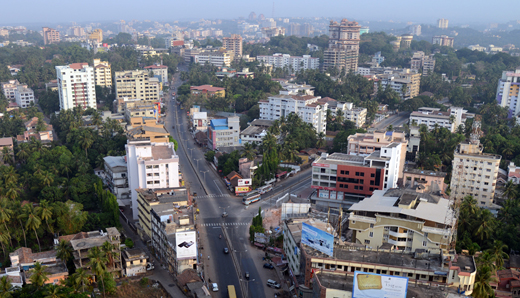
Mangalore, Oct 14: In order to relieve the traffic congestion and enable smooth flow of traffic in the city, especially during peak hours, the Mangalore City Corporation has decided to propose the widening and development of 22 roads in the city limits.
After several complaints from motorists and citizens over the regularity and rise of traffic congestion in most major traffic junctions in the city during the day, the city corporation decided to ensure better traffic management with widening of roads and major junctions in the city.
To achieve this, it was decided in a city council meeting to widen and develop selected roads which would help in easing the traffic congestion. It was also proposed that the major junctions and circles in city corporation limits would be widened and developed through tenders to help ease the congestion in traffic and avoid blockades.
As per the proposal, Circuit House junction, Kavoor junction, Rao and Rao junction, Clock Tower junction, Lower Bendoor junction, Navabharat junction, Kankanady junction, Karavali junction, Karangalpady junction, Bondel junction, Nandigudda junction, City Hospital junction and Ivory junction will be widened and developed.
The roads proposed to be widened and developed are: 1. Kavoor junction to Kavoor Mahalingeshwara temple, 2. Maryhill junction to Bondel junction (development of footpath, storm water drain), 3. Yeyyadi to Shaktinagar concrete road, 4. Derebail - Konchady to Mullakadu, 5. Kuntikana fire station to Barebail-Yeyyadi concrete road, 6. Urwa Store to Urwa Market and Ashoknagar, 7. Kadri Park to Padua High School (NH Junction), 8. Padavu High School to Sharbath Katte, 9. Kalpane Kulshekhar (NH-13) to Shaktinagar, 10. Suryanarayana temple road in Maroli, 11. City Hospital junction to Pinto's Lane (via Kadri Kambala), 12. Bunts Hostel to PVS junction, 13. Navabharath Circle to Besant College (via Sharada Vidyalaya), 14. Six lanes along KSRTC - Lalbagh road, 15. K S Rao Road, 16. New Balmatta Road (Jyothi to Ivory junction), 17. Milagres junction to railway station, 18. Nandigudda to railway station, 19. Sturrock road (Ivory junction to Anand Shetty Circle, Attavar), 20. S L Mathais Road (Casa Grande to Highland junction), 21. Falnir Road (Ivory junction to Kankanady circle), 22. Kankanady railway station road (near Nagori)






Comments
One more book suggestion; simply got done checking
out \The Snowball\"-- the licensed bio
For a book that throws every \typical\" investing strategy under the bus, I suggest a book that just came out just recently
called \"Killing Sacred Cows.\" Written by up-and-coming
financial expert Garret Gunderson, who was a multi-millionaire at 26 (so he
actually practices what he preaches). 401(k), not a smart idea according to Garrett.
Instead, find your distinct ability and what you're enthusiastic about and
go from there ... I like it.LikeLike
Here is my blog post :: first lawyer: http://www.google.com"
Add new comment